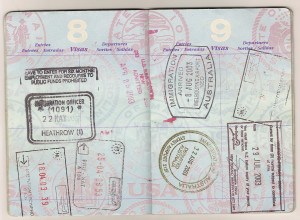By Sarah Saint
On April 30, 2015, the Fourth Circuit issued a published opinion in the civil case Hernandez-Avalos v. Lynch. Maydai Hernandez-Avalos and her son fled El Salvador after being thrice threatened by Mara 18, an aggressive gang, and entered the United States without valid entry documents. Hernandez petitioned for asylum, which the Immigration Judge denied. The Board of Immigration Appeals affirmed this decision. Hernandez-Avalos petitioned for review of a final order of removal by the Board of Immigration Appeals (BIA). The Fourth Circuit granted the petition for review, vacated the BIA’s order, and remanded the case for further proceedings.
Hernandez’s Story and Summary of Removal Proceedings
In 2007, members of the El Salvador gang Mara 18 killed the cousin of Hernandez’s husband. After the burial, armed members of Mara 18 threatened to kill Hernandez if she identified Mara 18 to the authorities as the men responsible for her cousin-in-law’s murder. A few months later members of Mara 18 put a gun to Hernandez’s head and threatened to kill her because she would not allow her son to join Mara 18. In May 2008, Mara 18 threatened to kill Hernandez a third time when she again would not allow her son to join Mara 18. Hernandez was afraid to report these incidents to the police because gang members are frequently released within days of their arrest and retaliate against complaining witness. Instead, she and her son fled El Salvador before dawn the next day.
In 2008, Hernandez and her son entered the United States without valid entry documents. She sought relief from deportation in the form of asylum and requested withholding of removal under the Immigration and Naturalization Act (INA). Hernandez thinks that if she goes back to El Salvador, members of Mara 18 would kill her. However, the Immigration Judge denied Hernandez’s petition for asylum because she had neither established that she would likely suffer future persecution on account of a protected ground nor established that she was threatened by persons the Salvadoran government was unwilling or unable to control. Hernandez appealed to the BIA, which affirmed the Immigration Judge’s decision. Hernandez then appealed to the Fourth Circuit, which vacated the BIA’s order and remanded the case for further proceedings.
Standard of Review
The BIA issued its own opinion without adopting the Immigration Judge’s reasoning. The Fourth Circuit reviewed only the BIA’s final order. Factual findings are reviewed under the substantial evidence standard: they are conclusive “unless any reasonable adjudicator would be compelled to conclude to the contrary.” Legal conclusions are reviewed de novo. The Fourth Circuit must uphold the BIA’s decision “unless it is manifestly contrary to law and an abuse of discretion.
Hernandez Established her Eligibility for Asylum
To establish eligibility for asylum under 8 U.S.C. § 1101(a)(42)(A), Hernandez must prove she (1) has a well-founded fear of persecution; (2) on account of a protected ground; (3) by an organization that the Salvadoran government is unable or unwilling to control. The Fourth Circuit found that Hernandez satisfies the first element because the threat of death meets the requirement for persecution.
The BIA incorrectly found that Hernandez did not satisfy the second element because Hernandez was persecuted because she would not allow her son to join the gang, not because she was her son’s mother. The Fourth Circuit determined this was manifestly contrary to law and an abuse of discretion because Hernandez’s relationship with her son was why she was threatened. Accordingly, the Fourth Circuit found that Hernandez satisfies the second element.
The BIA also incorrectly relied on the Immigration Judge’s conclusion that Hernandez did not satisfy the third element, that the El Salvador government could not control Mara 18. The Immigration Judge relied on its own knowledge of country conditions. The Fourth Circuit found that Hernandez’s credible testimony about the Salvadoran police being unable to protect her from Mara 18 was sufficient.
Petition for Review Granted and Case Remanded
Because Hernandez established her eligibility for asylum, the Fourth Circuit determined that Hernandez met all three elements for eligibility for asylum. Accordingly, the Fourth Circuit granted Hernandez’s petition for review and remanded the case to the BIA for further proceedings.












